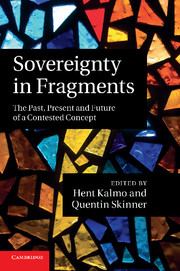Book contents
- Frontmatter
- Contents
- Notes on contributors
- Acknowledgements
- Introduction: a concept in fragments
- 1 The sovereign state: a genealogy
- 2 The apparition of sovereignty
- 3 The Westphalian myth and the idea of external sovereignty
- 4 Double binds: sovereignty and the just war tradition
- 5 The durability of organized hypocrisy
- 6 A matter of fact? The many faces of sovereignty
- 7 The survival of sovereignty
- 8 Sovereignty and after
- 9 Prolegomena to the post-sovereign Rechtsstaat
- 10 Sovereignty beyond the state
- 11 Sovereignty between government, exception and governance
- 12 Conclusion: vocabularies of sovereignty – powers of a paradox
- Bibliography
- Index
8 - Sovereignty and after
Published online by Cambridge University Press: 04 February 2011
- Frontmatter
- Contents
- Notes on contributors
- Acknowledgements
- Introduction: a concept in fragments
- 1 The sovereign state: a genealogy
- 2 The apparition of sovereignty
- 3 The Westphalian myth and the idea of external sovereignty
- 4 Double binds: sovereignty and the just war tradition
- 5 The durability of organized hypocrisy
- 6 A matter of fact? The many faces of sovereignty
- 7 The survival of sovereignty
- 8 Sovereignty and after
- 9 Prolegomena to the post-sovereign Rechtsstaat
- 10 Sovereignty beyond the state
- 11 Sovereignty between government, exception and governance
- 12 Conclusion: vocabularies of sovereignty – powers of a paradox
- Bibliography
- Index
Summary
Sovereignty is an interesting and important topic for contemporary Europeans. For some years there has been controversy about what has happened to sovereignty in the context of the European Union. Have member states of the Union lost or ceded sovereignty to the Union, or merely transferred the exercise of certain of their sovereign rights? Has the Union acquired, or is it acquiring, a new sovereignty that will override that of the member states and their peoples? Is there an emerging ‘sovereign people’ of Europe, or is there merely a multiplicity of peoples who may or may not retain separate popular sovereignties? Is Europe a locus of ‘post-sovereignty’ or ‘late sovereignty’, or some other new variant on classical sovereignty?
My previous contributions to this debate have argued for post-sovereignty. The changes in the internal and external constitutional powers and political capabilities of the member states in their relation to the Union amount to an abandonment of key attributes of sovereignty as this was classically understood. Yet this has occurred without the Union's acquiring powers and capabilities amounting to sovereignty in the classical sense. The Union is not a sovereign super-state, nor a sovereign federal union. One day it might become one, but there is no inevitability about this and, in the perspective of the first decade of the twenty-first century, it does not seem very likely to happen.
- Type
- Chapter
- Information
- Sovereignty in FragmentsThe Past, Present and Future of a Contested Concept, pp. 151 - 168Publisher: Cambridge University PressPrint publication year: 2010
- 4
- Cited by



